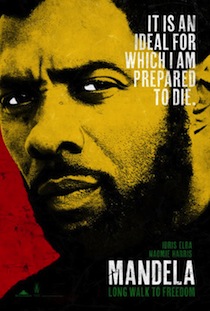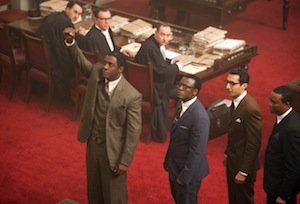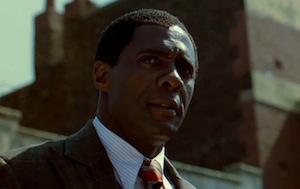 The new film Mandela: Long Walk to Freedom chronicles the life of Nelson Mandela (played by Idris Elba) from his birth in Mvezo to his election as President of South Africa. Director Justin Chadwick attempts to show Mandela as the complex and multifaceted person he was, but in cramming in a multitude of facts, Chadwick misses any grand truths of Nelson Mandela’s influential life.
The new film Mandela: Long Walk to Freedom chronicles the life of Nelson Mandela (played by Idris Elba) from his birth in Mvezo to his election as President of South Africa. Director Justin Chadwick attempts to show Mandela as the complex and multifaceted person he was, but in cramming in a multitude of facts, Chadwick misses any grand truths of Nelson Mandela’s influential life.
The difficulty that Chadwick seems unwilling to face in regards to Mandela’s life is that there are hundreds of stories that could be told. Choosing one story would limit the focus, but could act as a lens through which the viewer may see and understand the other parts of Mandela’s life.
We could look at Mandela, the young nonviolent protestor, and his radicalization into a violent guerrilla activist. The focus could give the viewer pause to question whether the idealism of nonviolent action can ever stand in the face of an oppressor willing to employ violent tactics.
The story could focus on the personal life of this amazing leader. Mandela was private and his personal life was filled with tumult. His first wife, Evelyn (Terry Pheto) left him due to his political activism and philandering. His second wife, Winnie (Naomie Harris), was herself a freedom fighter, but philosophical differences and years of estrangement due to Nelson Mandela’s imprisonment would drive them apart too.
 Had Chadwick give heavy emphasis to Mandela’s personal relationships, he could have shown the high personal price and individual sacrifices that Mandela and those closest to him were forced to make as the price for political change and the freedom for the people of South Africa.
Had Chadwick give heavy emphasis to Mandela’s personal relationships, he could have shown the high personal price and individual sacrifices that Mandela and those closest to him were forced to make as the price for political change and the freedom for the people of South Africa.
The focus could have been entirely on the negotiations that took place prior to Mandela’s release. The meetings with De Klerk’s advisors and Mandela’s tactful unwillingness to accept anything other than a complete and unconditional release from prison, and the full political recognition and voting rights of Africans with in the South African state would have been a worthy story indeed.
Here Mandela’s political savvy could take center stage, with occasional references to his prior insurgent activity when the story required it. The viewer could be consumed with the delicate balance that faced these men. A misstep in either direction could plunge South Africa further into civil war.
Chadwick’s mistake is his need to address all aspects of Mandela’s life equally and move through it in strict chronological fashion. It rushes many of the more emotionally charged or politically tense moments, and forces Chadwick to rely on swelling orchestral music to cue the viewer’s emotional response.
 It also puts far too much reliance on excellent performances from Idris Elba and Naomie Harris. Both are great in their roles, but they are unable to sustain the over two-hour film on their own.
It also puts far too much reliance on excellent performances from Idris Elba and Naomie Harris. Both are great in their roles, but they are unable to sustain the over two-hour film on their own.
If Chadwick had made a decisive choice about which Nelson Mandela story to tell, he could have given us a decisive and impactful film. Instead the film is poorly structured because it attempts to cover too much ground. It works like an exciting piece of history made boring by a bad teacher, a point which is made all the more poignant because of the celebrations following Mandela’s recent death.
Chadwick’s film is a long walk, but instead of freedom as its destination, we arrive at boredom and disappointment.







Comments on this entry are closed.